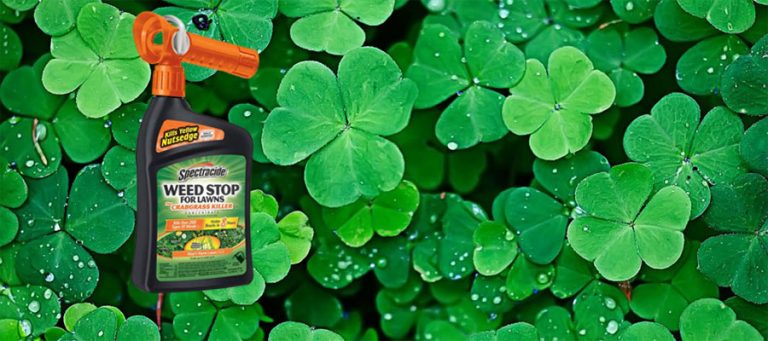Seeing white flowers popping up in an otherwise green lawn is a sign that clover has moved in. This perennial weed spreads easily in moist areas and lawns that lack nitrogen. While clover can benefit soil, most homeowners want to get rid of clover and maintain a uniform turfgrass lawn. The good news is that there are effective clover weed killers that target clover without harming surrounding grass.
What is Clover?
Clover, also called white clover or Dutch clover, is a perennial in the legume family It has characteristic rounded leaflets in groups of three on the end of long petioles. The low-growing weed produces small white or pink flowers that attract bees Clover spreads by seeds and creeping stems that root along the ground.
Clover thrives in underfed lawns that lack nitrogen. It performs well in moist soil. If not controlled, clover will spread rapidly across turfgrass. Homeowners have several options for clover weed control.
Why Get Rid of Clover?
While clover can benefit soil, there are reasons homeowners want to eliminate it
- Creates uneven patches instead of uniform lawn
- Spreads rapidly through seeds and creeping stems
- Attracts bees that could sting children or pets
- Can crowd out and weaken desired grass
- Looks messy once flowers fade and die
- Grows aggressively in moist, shady areas
Controlling clover helps maintain thicker, fuller turfgrass. However, it’s important to also promote healthy grass through proper mowing, watering, and fertilization.
Clover Weed Killer for Lawns
Several effective clover weed killers are available for treating lawns. Products contain active ingredients that target broadleaf weeds but won’t harm surrounding grass. Two common options are:
2,4-D – a systemic herbicide that causes uncontrolled growth leading to the death of broadleaf weeds.
Dicamba – also causes abnormal cell growth and plant death. Often combined with 2,4-D or MCPP.
MCPP – disrupts normal plant hormone functions. Commonly combined with 2,4-D or dicamba.
Pelargonic acid – destroys plant tissues on contact. Organic herbicide derived from plants.
Corn gluten meal – organic option that inhibits seed germination and root development.
Always read and follow label instructions when using any chemical weed killer. Selective herbicides work best when spot treated directly on clover plants. Liquid sprays or granular products can be used. Granular weed killers may be more effective when applied in early morning before clover leaves are dry.
10 Ways to Get Rid of Clover Naturally
For those wishing to avoid chemicals, here are some natural DIY remedies to kill clover:
- Manually pull up small clumps
- Use corn gluten meal to prevent seed germination
- Solarize clover patches using plastic sheeting
- Mow high at 3-4 inches to reduce sunlight exposure
- Apply vinegar-based homemade weed killer sprays
- Use organic herbicides with pelargonic acid
- Water infrequently and deeply to discourage growth
- Apply nitrogen fertilizer to promote healthy grass
- Reseed bald spots immediately after removing clover
- Overseed lawn in fall to thicken turfgrass
While natural options may take longer, they can successfully eradicate clover without chemicals. Be patient and persistent when using natural treatments.
When to Apply Clover Weed Killer
The best times to apply clover weed killers are:
-
Spring – Treat early spring before clover plants flower and set seed.
-
Fall – Spray weeds in fall to inhibit growth and prevent spring germination.
-
Summer – Spot treat during summer to control individual clover plants.
Avoid spraying herbicides during hot, dry weather or before rain. Follow product labels for specific application instructions. It often takes 2-4 weeks after application to see clover dying off. Reapply if any plants are still thriving after 4 weeks.
How to Prevent Clover Infestations
While clover weed killers can eradicate existing clover, the best solution is preventing it in the first place through proper lawn care:
- Mow high at 3-4 inches for thicker turfgrass to crowd out weeds
- Water thoroughly only when top 1-2 inches become dry
- Fertilize 4 times per year with nitrogen-rich formula
- Dethatch and aerate periodically to alleviate soil compaction
- Overseed bare or thin areas with quality grass seed
- Allow grass to grow taller in shaded areas
Keeping turfgrass dense and vigorous is key to preventing clover and other weeds from invading. Be patient and consistent when managing lawn issues to maintain healthy grass.
When to Call a Lawn Care Expert
If you don’t see clover improving after 2-3 herbicide applications, it may be time to call in a professional lawn care company. Experts can assess your situation and determine the best treatment plan.
Severe clover infestations often indicate underlying issues like improper mowing height, insufficient nitrogen, or disease/insect damage. Professionals have the knowledge and tools to diagnose and correct lawn problems, ensuring long-term clover control.
While clover has some benefits, most homeowners want to get rid of this rapidly-spreading lawn weed. Selective broadleaf herbicides provide an effective option for clover control without harming surrounding grass. For a natural approach, corn gluten meal, vinegar sprays, manual removal, and proper lawn care techniques can eliminate clover over time. Taking a proactive approach is critical both for removing existing clover and preventing recurrence in the future.
How to KILL CLOVER in your LAWN
FAQ
What product kills clover but not grass?
When should I kill clover in my lawn?
Will 2.4D kill clover on lawn?
- A Complete Guide to Caring for Yuki Cherry Blossom Shrub - January 23, 2025
- Identifying Red Hot Poker Seeds: What to Look For When Harvesting Torch Lily Pods - January 23, 2025
- A Complete Guide to Harvesting Evening Primrose Seeds - January 23, 2025

